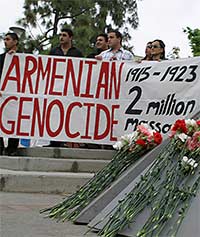Campus marks Armenian Genocide 90th anniversary
By NYRIE KARKAZIAN
Students gathered in the Free Speech Area Friday afternoon to commemorate
the 90th anniversary of the Armenian Genocide of 1915.
Two young men dressed in black held a large sign in the background that
read “Armenian Genocide, 1915-1923, 2 million massacred,”
as the crowd waited in silence for the program to begin.

Armenian Students Organization members, display a banner in memory
of people killed during the Armenian Genocide 90 years ago.
Photo by Joseph Vasquez |
“The people who were in the death marches of the genocide marched
because they saw rape, their land was taken, their families were stolen
from them, but they continued so that their stories would be told,”
said Sevag Tateosian. “That’s what we are doing here, so that
their stories are told, so that they marched for something.”
The sad and drawn-out hum of Armenian dudook music played as Hakop Tataryan,
the Armenian Students Organization president, approached the stage to
open the ceremony.
On Thursday, Gov. Schwarzenegger signed Senate Bill 424, issued by Senator
Chuck Poochigian, which permanently designated April 24th as the “Day
of Rememberance of the Armenian Genocide,” Tataryan said.
“With growing attempts to revise the historical record of this period
and denial of truth by the Turkish government, it’s vitally important
that false depictions of the tragedies of the genocide are rejected,”
Poochigian said. “SB 424 will help ensure that generations to come
in California will continue to understand and recognize April 24th as
the Day of Remembrance of the Armenian Genocide.”
Tataryan’s speech was followed by poem readings by students. The
first poem, called “The Dance,” was read in English and spoke
of women being tortured during the massacre. The second was recited in
Armenian by Armine Sarkissian.
Armenian studies professor Barlow Der Mugrdechian, spoke of the history
of events of the time. He mentioned Taniel Varoujan, a famous Armenian
poet, who was brutally murdered by the Young Turk government at the age
of 31 in 1915.
According to Shant Norashkharian’s biography of Varoujan, an eyewitness
of his martyrdom said after being arrested, Varoujan and the other prisoners
were robbed, taken to the woods and stripped. Then they were tied to the
trees one by one and slowly cut open by the policemen who took them there.
Their screams could be heard from afar, where the eyewitness was hiding.
Along with Varoujan, many other important officials, dignitaries and clergy
were murdered that year, leaving the people of Armenia leaderless. Thus
began the massacre and annihilation of the Armenians.
“They were the last people to see Armenia,” Der Mugrdechian
said. “We form a sense of communtiy by coming here today.
There are virtually no Armenians left in the area that was Armenia’s
original homeland, which now belongs to Turkey. Although the Turkish government
continues to deny the genocide, Armenians are set on combating this denial
by whatever means necessary.
“It’s not enough only to say there was an Armenian Genocide,”
Der Mugrdechian said.
Stephanie Stockdale, a student in the Armenian Studies program, said she
thinks there needs to be recognition from major entities around the world,
especially Turkey.
Red carnations were passed out by the ASO toward the end of the commemoration
as the dudook music began playing again. Each person stood in line to
lay his or her flower beside a small recreation of the genocide monument
in Armenia called Dzidzernagapert.
|
